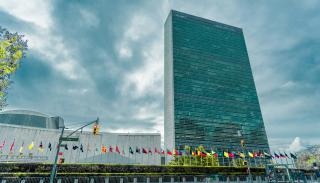
Breadcrumbs navigation
Norm expressivism and punishment in International Relations
In this short video extract, Cornelia Baciu discusses the key arguments from her new Review of International Studies article - Norm expressivism and punishment in International Relations
Want to know more? You can read the full article at DOI: https://doi.org/10.1017/S0260210524000949
BISA members receive access to RIS (and to our other journal European Journal of International Security) as a benefit of membership. To gain access, log in to your BISA account and scroll down to the 'Membership benefits' section. If you're not yet a member join today.
Abstract
Although expressivism has been studied in relation to criminal justice since the emergence of modern international criminal law, an expressivist perspective in norms and criminal justice research resurfaced in the past decades, inviting a new viewpoint on the dynamic interplay between norms and symbolic action in International Relations (IR). Situated as an account of punishment, expressivism has been criticised for being too abstract and lacking an immanent meaning or for its dialectic position in relation to punishment. Addressing this theoretical shortcoming, this article remediates our understanding of expressivism, establishing new knowledge of the meaning of norm expressivism in IR and clarifying the relationship between expressivism and notions of punishment in criminal justice and norm research. To this end, it hermeneutically deconstructs the rhetoric of country delegates at the United Nations in the aftermath of Russia’s full-scale invasion of Ukraine. It examines crucial examples of expressivism: disagreement pronouncements, denunciation of norm violation, postulation of guilt, and penal analogies. While criminal justice research posits expressivism as a distinct account of punishment, the novelty of this article consists in illustrating how, even in the absence of prosecution in the courtroom, expressivist rationales can have a reinforcing effect on the international legal order.
Photo by Nils Huenerfuerst on Unsplash

